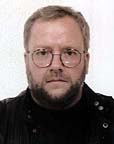|
Jim Colburn - Don't Ask The Sliding Scale |
 |
|
American journalists are an elite bunch, sometimes an elitist bunch. They've usually gone to college, gotten a BA and taken a few ethics courses. They are members of a "profession" like doctors and lawyers and their unions are called "guilds." In other countries this may not be the case. In many places journalism is a "trade" practiced by high school drop-outs who start out as copy boys and work their way up to reporter. To be a photographer is to hit the street at age 17 with a camera and a lens looking for celebs, fires and dead bodies. If you get the shot you make your week's rent, if you miss it you're out of luck. So it's no wonder that to an American journalist some foreigners are lacking in journalistic ethics. But we're an era of globalization. You're going to take the work where you can get it and you're going to have to learn to keep the customer satisfied if you want to eat. The world is getting smaller by the day and it's about time that American journalism caught up with their compatriots. I propose an international sliding scale of ethics. The ethics you would practice at any given time are those of the newspaper or magazine that's paying you for today's output. Maybe there could be a one to ten scale that could be used as a reference. Maybe there could be some sort of correlation between assignment rate and ethics required for the job. "You want me to shot this at an 8.5 level? That'll cost you $250 a day more." If you're shooting a job for the New York Times you won't be able to do a damn thing. You'll be an observer. A fly on the wall. You won't be able to tell someone what to do, where to move or whose hand to shake. If, on the other hand, you're doing a job for one on London's finer tabloids you can bribe guards, get somebody drunk, hire hookers and try to convince small-town girls to flash their breasts. If you're working for a French magazine you'll have to load high-speed film into your camera and push it four stops to make the pictures look "sneaky" even if your celebrity subject is in a fine mood and poses for you. This may be a difficult transition for some photographers but it may be even harder for some editors. Editors will have to trust the intelligence and inner moral compass of the photographers they hire to set their "ethics meter" at the appropriate level for the day. They'll have to stop rolling their eyes when they find out that you spent three days last week doing a stake out at the vacation home of a member of N'Sync for the National Enquirer. And those pictures you "took" of Britney Spears topless on a beach in Florida? "Oh you mean you DON'T use Photoshop that way?" DISCLAIMER: The opinions expressed are barely my own much less my employer's so don't blame Time Magazine, Time Inc. or AOL-Time-Warner for anything written here. Blame that officious French security guard who wouldn't let me set up a tripod in a nearly deserted, open field because "someone might trip over it." Jim Colburn
|
|
|
ARCHIVES
| PORTFOLIOS
| LINKS |
|